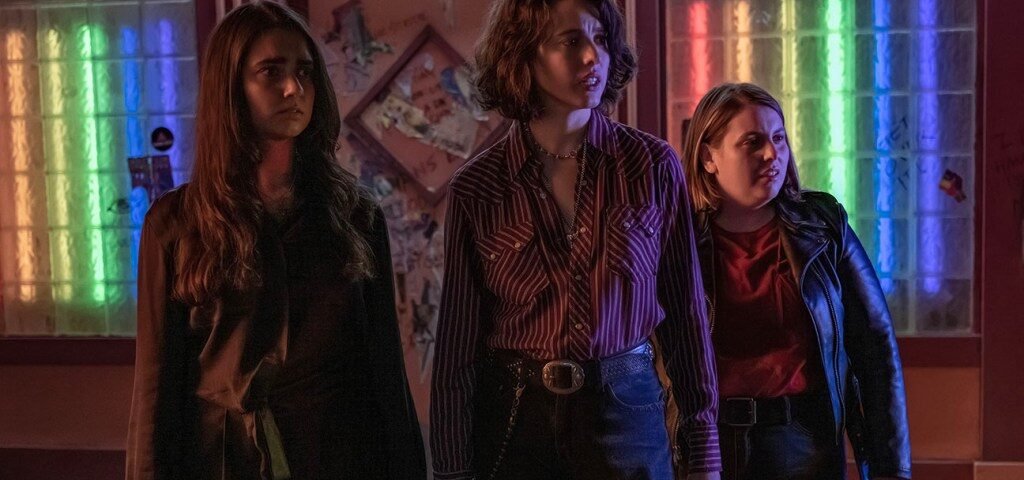


‘Spaceman’ Review: Adam Sandler and Carey Mulligan Navigate Marriage Across the Universe in Absorbing but Trite Netflix Sci-Fi
February 26, 2024


‘Dune: Part Two’ Review: Timothée Chalamet and Zendaya in Denis Villeneuve’s Gorgeous but Limited Sequel
February 27, 2024Colman Domingo, Pedro Pascal and Matt Damon also appear in this nutty comedy set in 1999, written by Coen with his wife Tricia Cooke.
Drive-Away Dolls
O brother, where art thou?
Joey Slotnick and CJ Wilson, who play hapless goons on the trail of a missing briefcase in Drive-Away Dolls, are both veterans of Ethan Coen’s New York stage productions. Those plays, whether one-acts or full-length, have mostly been flimsy doodles with some decent jokes, not the kind of material that would have leading off-Broadway companies lining up to produce them without the draw of a famous-name playwright. Coen’s first solo narrative feature as director is a similarly lightweight vehicle, enlivened by some talented actors but way too pleased with itself for something so inconsequential.
In terms of kinship within the Coen brothers oeuvre, the caper seems to be aiming for the exuberant eccentricity and infectious sense of mischief of Raising Arizona. But the knockabout humor just isn’t all that funny; its transgressive spirit too often feels forced. The escalating chaos of the plot — revolving around two women who find themselves unwittingly in possession of a briefcase whose highly sensitive contents could end a prominent Republican political career — plays like strung-together vignettes and twisty turns wrapped up abruptly and too easily.
The silver metal briefcase is first seen in a Philadelphia cocktail bar in 1999 being clutched tight by jittery Santos (Pedro Pascal). He flees in terror, pursued down a blind alley by a thug posing as a bartender; the evening doesn’t go well for him, even before inept henchmen Arliss (Slotnick) and Flint (Wilson) show up. The case is then installed in the trunk of a Dodge Aries, along with a gruesome memento from Santos. The car is to be picked up at a Drive-Away rental company run by shady middle-man Curlie (Bill Camp) and delivered to an address in Tallahassee, Florida.
Invariably in screwball plots like this, the precious cargo ends up in the wrong hands. That’s where free-spirited Southern gal Jamie (Margaret Qualley) comes in when her voracious sexual appetite spells the end of her relationship with pugnacious cop Sukie (Beanie Feldstein), who’s none too pleased to be stuck with their dog, Alice B. Toklas.
Wishing to put some distance between herself and her humiliated ex’s wrath, Jamie drags her buttoned-up friend Marian (Geraldine Viswanathan) on a road trip to — you guessed it — Tallahassee, intending to check out the BBQ joints and lesbian bars on the way. The latter stops include the amusingly named Butter Churn and She Shed; there’s also an interlude with a women’s soccer team who spend their downtime in regimented makeout sessions to Linda Ronstadt.
Coen and Cooke undersell the suspense by having Jamie be mostly unfazed by the discovery of their unintended stash and also eliminating many of the more menacing threats closing in on them. But it makes sense for the hedonistic character to remain focused on a good time, as well as getting her uptight friend Marian laid. That track leads to a resolution that doesn’t play convincingly, but the movie is too high on its zany humor to concern itself with such details as chemistry.
The contents of the briefcase are suggested in trippy psychedelic interludes featuring an unbilled major-name pop-rock star and gradually tracing an uncomfortable connection to Senator Gary Channel (Matt Damon), that if exposed, won’t sit well with his family-values platform. Without giving too much away, if you’re familiar with the main claim to fame of sculptor Cynthia Plaster Caster, you can figure it out, although exactly how the incriminating material can be traced to the senator the script doesn’t bother to explain.
Coen assembles a pro team including DP Ari Wegner, production designer Yong Ok Lee and longtime composer Carter Burwell, so the movie is a spiffy enough package even if its inspirations are more nominal than discernible onscreen. The filmmakers cite Meyer’s Motorpsycho, Doris Wishman’s Bad Girls Go to Hell and the Robert Aldrich noir Kiss Me Deadly, raising the question of why they didn’t just set Drive-Away Dolls in the 1950s or ‘60s instead of in the runup to Y2K, which pays zero narrative dividends.





